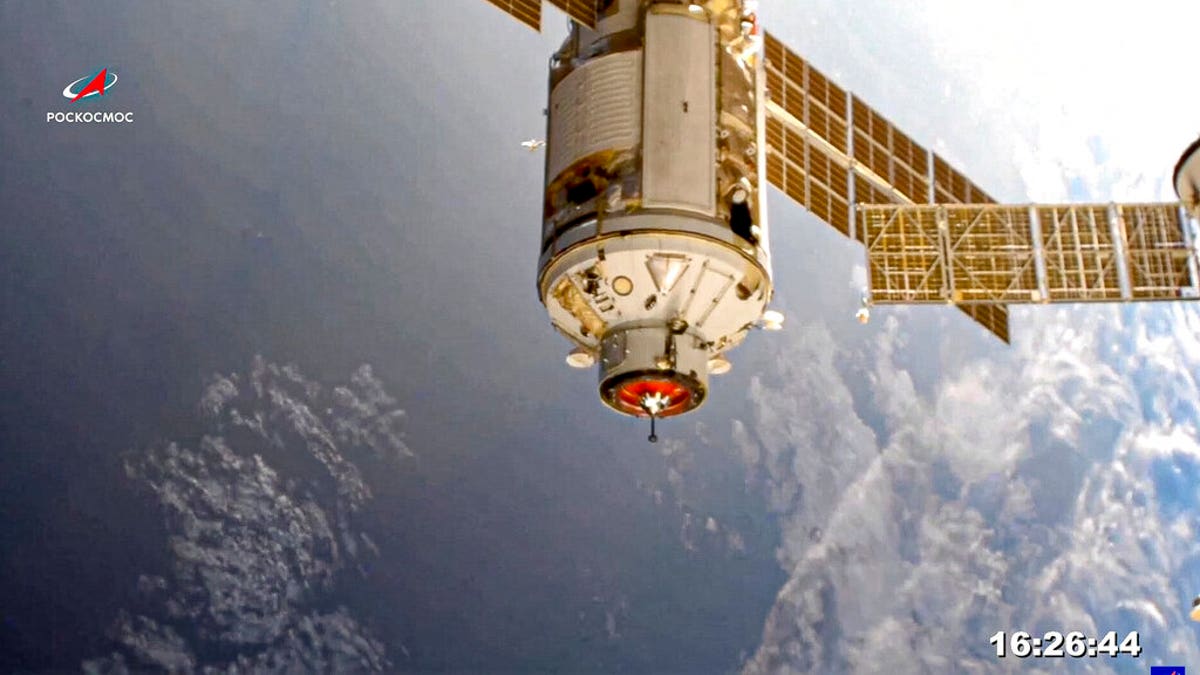Fox News Flash top headlines for July 29
Fox News Flash top headlines are here. Check out what's clicking on Foxnews.com.
Russia’s Nauka space module caused a scare on the International Space Station Thursday after its engines inexplicably lit up the hours after it docked in orbit.
The "unplanned restart" of the module’s engines inadvertently moved the entire ISS out of position for 47 minutes, according to NASA.
During a livestream of the event, Mission Control in Houston said that NASA had "temporarily lost orientation control as the result of inadvertent thrust firings" and that the error had knocked the station of alignment by "about 45 degrees."
NASA later tweeted that Mission Control and the crew aboard the station had corrected the orientation and all systems were operating normally. The ISS has to be oriented precisely in order for its solar panels and radio equipment to work properly – and the station lost contact with ground control twice during the incident.
CHINA'S LOOSELY REGULATED ROCKET DEBRIS COULD BE DANGEROUS – AND HARMFUL TO US INDUSTRY
"The crew was never in any danger," the space agency later tweeted.
However, Dr. Jonathan McDowell, a leading space expert at the Harvard-Smithsonian Center for Astrophysics expressed some concern about the safety of the astronauts in orbit.
"’The crew were never in any danger’ ... I'm not convinced they understand the issue well enough to be able to say that right now," he wrote. "This is the sort of thing that in my opinion could - if handled wrongly - lead to loss of the station."
Authorities did not immediately have an explanation as for why the engines turned on but said flight controllers overcame the situation by using thrusters on other Russian station components to counteract the rogue engines.
The Nauka mission has been delayed for a decade for a range of issues and underwent several "hiccups in orbit" and engine trouble on its way to rendezvous with the ISS, according to the European Space Agency.
It was initially scheduled to go up in 2007.
In 2013, experts found contamination in its fuel system, resulting in a long and costly replacement. Other Nauka systems also underwent modernization or repairs.
It finally arrived Thursday as Russia hopes to revitalize its space industry to remain competitive with the U.S. and ahead of growing programs in other countries, including China.

In this photo provided by Roscosmos Space Agency Press Service, the Nauka module is seen prior to docking with the International Space Station on Thursday, July 29, 2021. Russia's long-delayed lab module successfully docked with the International Space Station on Thursday, eight days after it was launched from the Russian space launch facility in Baikonur, Kazakhstan. The 20-metric-ton (22-ton) Nauka module, also called the Multipurpose Laboratory Module, docked with the orbiting outpost after a long journey and a series of manoeuvres. (Roscosmos Space Agency Press Service photo via AP)
The module will become a permanent part of the orbital station, holding research and lab equipment.
The space station is currently operated by NASA astronauts Mark Vande Hei, Shane Kimbrough and Megan McArthur; Oleg Novitsky and Pyotr Dubrov of Russia’s Roscosmos space corporation; Japan Aerospace Exploration Agency astronaut Akihiko Hoshide and European Space Agency astronaut Thomas Pesquet.
The fiasco prompted NASA to postpone the planned launch of Boeing’s Starliner spacecraft from Cape Canaveral in Florida Friday, but officials said there was no damage and they praised the crew for remaining calm under pressure.
CLICK HERE TO GET THE FOX NEWS APP
"It takes thousands of people on the ground to ensure the safety of the @Space_Station and crew," NASA Administrator Bill Nelson tweeted. "The @NASA family’s ingenuity and dedication never cease to amaze me and, on days like this one, I’m more thankful than ever for their unparalleled expertise."
The Associated Press contributed to this report.









































